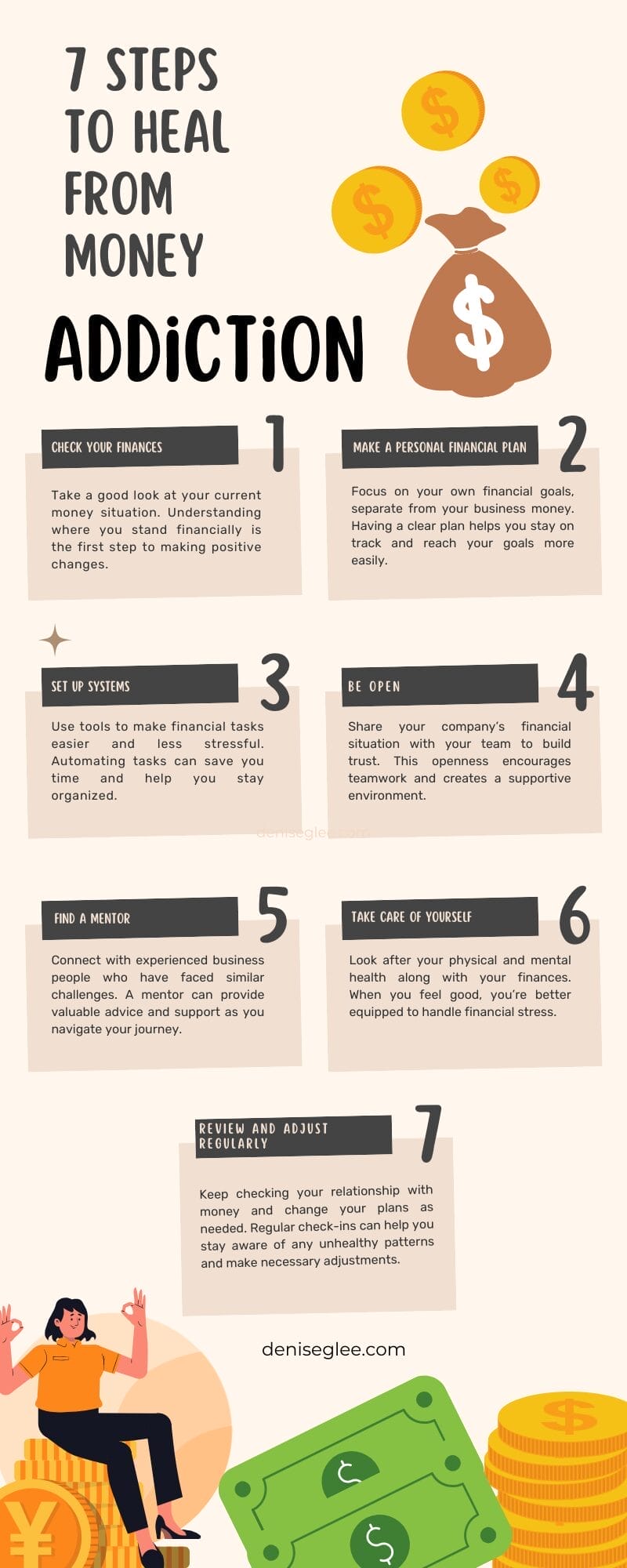
How Past Financial Trauma Can Turn Into a Money Addiction
As a healing and leadership coach, one of the biggest challenges I see with clients is money. For many, it feels like there’s never enough, even after reaching their financial goals.
If we’re being honest, the desire for more money often comes from past financial trauma that hasn’t been healed. In this article, we’ll dive into what financial trauma is and how it connects to money addiction. These problems are important for business owners to deal with because they can affect how you make decisions, take risks, and run your business. We’ll also cover tools to help you heal.
First up, let’s dive into financial trauma.
What is Financial Trauma?
Financial trauma refers to the bad experiences we have with money that affect how we handle our finances. These experiences can include growing up poor or dealing with financial crises as adults, and they can stay with us, influencing how we think and act when it comes to money.

I’ll never forget the memories of taking baths by candlelight. No, it wasn’t for the sake of romance; it was because my parents couldn’t pay the electric bill. I quickly learned that if I wanted to finish my homework, it had to be done before dusk. I also realized early on how easily money could come and go. To say that this didn’t affect me would be an understatement.
Throughout my 20s and 30s, I lived with a constant fear that I’d end up on the streets, unable to pay my bills. Thankfully, that never happened. But the memories of cut-off utilities and eviction notices on the apartment I shared with my father stayed with me. Those moments shaped my determination to create a more secure future for myself, turning that fear into motivation.
But, of course, my story isn’t yours. While you may not share my exact experience, you probably understand the pain of not having enough money for life’s basics. Let’s dive into some other causes of financial trauma.
Common Causes of Financial Trauma
- Growing up in poverty or persistent financial instability
- Experiencing a major financial loss
- Bankruptcy or foreclosure
- Job loss or long-term unemployment
- Medical debt
- Surviving an economic crisis
Just like any other traumatic event, financial trauma has a way of lingering on, like a cheap perfume in a crowded room.
Denise G Lee Tweet
As I list these, remember that it doesn’t matter if your financial trauma was a one-time event or something that happened repeatedly. A lack of financial security can lead to intense feelings that linger for years, if not decades. Here are some ways this can affect you later on:
- Fear of spending or investing money
- Extreme anxiety about financial decisions
- Avoidance of financial planning
- Compulsive spending or hoarding
- Difficulty trusting financial institutions
Dr. LaNail Plummer, an expert in financial trauma, says it well: “Trauma, in general, is an experience so negative that it changes how we operate. Financial trauma specifically refers to negative past experiences with money that affect one’s ability to function optimally.”
The Impact of Financial Trauma on Entrepreneurs

Fatima (not her real name) asked me, “Why are you talking about this, Denise? I can afford to pay you!”
My response was, “Yes, but clearly money still affects you. Otherwise, you wouldn’t be stuck financially for four years straight.”
I’m still shaking my head from that uncomfortable conversation.
For business owners like you, it’s easy to think you’re alright—that the past is behind you and you’re still marching forward. But unfortunately, just like any other traumatic event, financial trauma has a way of lingering on, like a cheap perfume in a crowded room.
How Financial Trauma Impacts Business Owners

- Risk-taking: The fear of financial loss can stop entrepreneurs from taking the necessary risks to grow their businesses.
- Decision-making: Trauma-induced anxiety can cloud your judgment when it comes to making important financial decisions.
- Networking: Feelings of shame or embarrassment about past financial struggles can hold you back from networking and forming partnerships.
- Fundraising: Fear of rejection or mistrust of financial institutions can make it tough to seek funding.
- Personal well-being: Financial stress can lead to burnout, which impacts your overall business performance.
I get it—these examples might feel a bit clinical, like something you’d skim on a Dave Ramsey blog or MSNBC article. That’s why, in the next section, I’m sharing a client story to show how unhealed financial trauma can profoundly impact someone’s professional life.
Carl's Never-Ending Game of Financial Catch-Up

I had a client named Carl (not his real name) who came to me on the heels of his latest financial disaster. It was wild to think about—how did he even afford my services? But I digress.
Carl is a social media advertising and marketing specialist. One of his selling points was telling clients, “If I don’t get your money back from these ads, I’ll pay for it myself.” A bold claim—and he backed it up with big, audacious goals, not just for his clients but for himself too.
While most of us might feel nervous running $50–$100 daily ads, Carl was pouring $550–$700 into daily ads. If you’re like me and not great at math, that’s up to $21,000 a month on ads. And here’s the thing: ads aren’t guarantees. Just because someone clicks doesn’t mean they’ll buy.
A Sure Bet That Went Sideways
So, Carl had this big product launch, and he was convinced that with the right copy and images, he’d hit it big. Instead of using his reserve funds for payroll, he poured everything into what he thought was a sure thing. “$30,000, I got this—let’s go!” he told me, recalling the experience.
Well, sometimes “sure bets” go sideways, and that’s exactly what happened to Carl. He spent $30,000 but only earned $10,000 in sales. To make matters worse, he didn’t have any money left to meet payroll and had to dip into his retirement savings to cover his monthly costs.
This wasn’t a one-time thing for Carl. Over 13 years, this pattern repeated itself multiple times. He kept liquidating his retirement funds, trying to chase the financial success he once had. In the end, Carl wasn’t just chasing financial success—he was running from the fear of failure, and it cost him more than money.
I hope these insights and Carl’s story connected with you. For entrepreneurs who want to build strong, lasting businesses, recognizing and dealing with financial trauma isn’t just helpful—it’s necessary.
As Carl Jung once said, “What you resist persists.” That being said, if you don’t deal with your financial trauma, it will result in a full-blown money addiction. In the next section, I will explain what money addiction is.
Recognizing Money Addiction
As I mentioned before, money addiction—whether you call it financial addiction or compulsive spending—is often rooted in financial trauma. It’s a behavioral addiction that shows up as an unhealthy obsession with money—whether that’s earning, spending, or hoarding it.
In fact, he’s straight-up admitted how his tough circumstances shaped him, saying: “I have a disease, it’s called ambition. I contracted it from not having.” It’s a raw, real statement that captures how deep financial trauma can run.
In the past, things weren’t always so rosy. 50 Cent’s money fixation caught up with him, leading to some serious issues:
- Bankruptcy: In 2015, he had to file for Chapter 11 bankruptcy after a string of bad personal and business decisions.
- Legal drama: Things got even messier when his social media posts painted a very different picture from the financial distress he claimed.
- Reputation hit: His public financial woes took a toll on his image and credibility. When money problems go viral, it’s hard to escape the fallout.
The Money Obsession: Why Our Culture is Hooked on Wealth and Fame
It feels weird to talk about this because we live in a culture with some serious issues around money. We praise celebrities and influencers who can buy multi-million dollar properties.
We love those rags-to-riches stories of people who once slept on benches and now walk the red carpet at exclusive events. It’s like you either have money or you don’t, and nobody wants to deal with you unless you’ve got six or seven commas in your checking account. Then we wonder why we have serious financial scammers like Bernie Madoff and Sam Bankman-Fried.
But I digress…

When you have a problem with money, it didn’t start in a vacuum. There were multiple signs that you and money have had a pretty unhealthy relationship. Here are some specific signs that money has you in a tight chokehold.
Signs of Money Addiction
- Constantly thinking about money
- Feeling a “high” from spending or earning money
- Hiding purchases or financial activities from others
- Neglecting relationships or responsibilities due to financial pursuits
- Feeling guilty or ashamed about money habits
- Inability to stick to a budget
For entrepreneurs, money addiction can manifest as:
- Workaholism
- Excessive risk-taking in business deals
- Neglecting personal life for financial gain
- Difficulty delegating financial tasks
If you’re constantly stressed about money, your brain can become overwhelmed, making it harder to find solutions or make good choices.
Denise G Lee Tweet
The Science Behind Financial Trauma and Addiction
Financial trauma and money addiction are closely tied to how our brains react to rewards and stress. When we experience financial stress or engage in poor money-related habits, it triggers a series of chemical responses in our brains:

- Cortisol: This is the hormone that goes up when we’re stressed about money. High cortisol levels can cause more anxiety, making it hard to think clearly and make good choices.
- Dopamine: Often called the “feel-good” chemical, dopamine is released when we earn or spend money. This feels great and makes us want to repeat those actions, even if they aren’t good for us.
- Oxytocin: Known as the “bonding” hormone, oxytocin levels can drop when we’re financially stressed. This can hurt our relationships and make it harder to trust others, leaving us feeling alone during tough times.
Understanding how your brain works is really important for entrepreneurs. It helps you see and manage your own money problems and habits. As entrepreneur and author Marie Forleo once said, “Your mind is a garden. Your thoughts are the seeds. You can grow flowers or you can grow weeds.” This quote reminds us that our thoughts about money can shape our lives. If you’re constantly stressed about money, your brain can become overwhelmed, making it harder to find solutions or make good choices.
When you know how your brain reacts to money stress, you can start to untangle these issues and move toward healthier ways of thinking and acting. As psychologist Dr. Tara Swart explains, “When we experience stress, our brain goes into fight-or-flight mode, which can cloud our judgment and lead to poor decision-making.” This means that under financial stress, you might not be thinking clearly, which can lead to choices that don’t support your long-term goals.
I hope this information helped. Next, we’ll talk about how to heal from past financial trauma.
Healing from Financial Trauma
Healing from financial trauma is a journey that takes time, kindness toward yourself, and sometimes professional help. Here are some steps to get started on your healing path:

- Recognize the addiction: Admit that your relationship with money has become unhealthy.
Identify triggers: Figure out what situations or feelings lead you to make poor financial choices.
Develop healthy coping strategies: Find ways to manage stress or emotions that don’t involve money.
Create boundaries: Set limits on your spending and financial activities.
Practice delayed gratification: Learn to hold off on instant financial rewards for better long-term outcomes.
Seek support: Think about joining a support group or working with a therapist who specializes in addiction.
Build a balanced life: Focus on other aspects of your life, like relationships, hobbies, and personal growth.
I know that all this information may seem abstract; that’s why, in the next section, we will discuss specific tools to help you on your financial healing journey.

The Role of Financial Education
You can’t heal what you don’t understand. Many people with financial trauma lack basic financial skills, which can lead to feelings of helplessness and anxiety. Here are some steps to boost your financial literacy:
- Read books about personal and business finance.
- Take online courses or workshops on money management.
- Work with a financial advisor or coach.
- Practice making and sticking to a budget.
- Learn about investing and future planning.
By improving your financial knowledge, you’ll feel more empowered and confident in managing your money.
Build a Healthy Relationship with Money
As you work through financial trauma and money addiction, it’s crucial to develop a healthier relationship with money. This means:
- Viewing money as a tool: Recognize that money helps you achieve your goals, but it’s not the goal itself.
- Practicing gratitude: Focus on what you have instead of what you lack.
- Aligning spending with your values: Ensure your financial choices reflect your personal and business values.
- Creating a giving strategy: Include charitable giving in your financial plans to foster a sense of abundance.
- Celebrating financial wins: Acknowledge and reward yourself for any financial progress, no matter how small.
- Maintaining work-life balance: Pursue financial success without sacrificing your personal well-being.
How a Healthier Money Relationship Helps You
Healing from financial trauma and overcoming money addiction can greatly enhance your ability to make smart business decisions. When you’re free from past traumas or unhealthy habits, you can:
- Make more rational, informed choices.
- Take calculated risks necessary for growth.
- Build stronger, more trusting relationships with partners and investors.
- Develop long-term strategies for your business.
- Improve your work-life balance and overall happiness.

Healing from Money Addiction: A Step-by-Step Guide
Here are some easy steps to start healing from financial trauma and dealing with money addiction:
- Check your finances: Take a good look at your current money situation.
- Make a personal financial plan: Focus on your own financial goals, separate from your business money.
- Set up systems: Use tools to make financial tasks easier and less stressful.
- Be open: Share your company’s financial situation with your team to build trust.
- Find a mentor: Connect with experienced business people who have faced similar challenges.
- Take care of yourself: Look after your physical and mental health along with your finances. If necessary, improve your self-care routine.
- Review and adjust regularly: Keep checking your relationship with money and change your plans as needed.
I hope these tips are helpful. The image below summarizes them. In the next section, I will share my final thoughts.

Final Thoughts
Healing from money problems and overcoming money addiction is a tough but important journey for entrepreneurs. By addressing these issues, you can create healthier and more successful businesses and enjoy a happier life.
Remember, this process takes time and often requires support. Don’t be afraid to ask for help from professionals or connect with others who understand what you’re going through. Your financial health is a big part of your overall success as a business owner.
If you’re ready to move forward in your journey to heal financially and succeed in your business, I invite you to work with me. As a coach who focuses on these areas, I can give you personalized guidance and support to help you overcome financial issues and grow your business.
I also encourage you to listen to my podcast, where I share practical tips for entrepreneurs.






